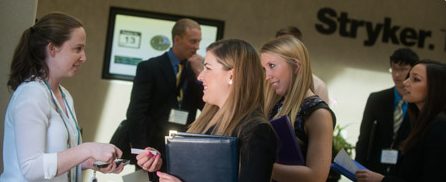Here in the Gonzaga Career & Professional Development (CPD) office, we work to carry out the mission of GU, particularly the part that states “Gonzaga models and expects excellence in academic and professional pursuits and intentionally develops the whole person.” Supporting every student regardless of class year or major is why we are here, but we find that some students are hesitant to visit us because of some incorrect assumptions they have about how we can help. That’s why we are busting a few CPD myths today, so you know exactly how our office can support you during your time at GU.
Myth: Career & Professional Development is only for upperclassmen.
Fact: CPD is here to help students at all levels of their career development. Your first year at GU is a great time to come into the office to get help with exploring possible careers, choosing a major, learning about internships, and so much more! You can even stop by the office if you don’t know what services you are interested in. Just meet with one of our staff members who will ask you questions to evaluate what next steps might be most helpful for you.
Myth: I have to know what I want to do for a career before I go to CPD.
Fact: Many of our services are tailored for students who have no idea what they want to do for a career when the graduate. In fact, we often work with students who need help choosing a major! We offer career assessments, career coaching, career options by major, the opportunity to connect with alumni who majored in specific fields or work in specific jobs, and so much more! There is even the Career Discernment Retreat on November 11-12 that is for students who would like a little more personal reflection time and access to in-depth tools to decide on a major or career. We love supporting students on their path of self-discovery, so stop by to set up an appointment.
Myth: They can only really help business or engineering majors.
Fact: While we do love working with engineering and business majors, we love working with students of all other majors and disciplines just as much. Throughout the year, we offer services for all students, even specifically tailoring some events just for disciplines outside business and engineering, including a corporate excursion to the Museum of Arts and Culture and a panel on service and government jobs abroad. The bottom line is that our office is equipped to serve students of all academic interests.
Myth: CPD can only help you get a job when you graduate.
Fact: CPD is here to support students prepare for their post-graduation plans, no matter where that takes them. We can help students to prepare for a variety of paths in a number of ways, such as applications and interviews for post-grad service, tools for finding for internships abroad, résumés and cover letters for on-campus clubs and organizations, interviews for graduate school, and more.
Myth: CPD will place me in a job or internship.
Fact: Our office provides many services to help students obtain jobs or internships, including résumé and cover letter reviews, mock interviews, job search tools, apparel guidelines, networking events, career fairs, and more. However, the job search process is one that a student must own for themselves, and therefore we do not take over it for you. Employers want to see the initiative of their candidates, and we will prepare you to put your best foot forward in this process.
Myth: I have to know exactly what I want to do with my life when I graduate.
Fact: There is no longer a trend in employment that careers last a working lifetime. The current generation of recent college graduates will have many different jobs in their professional experience, including jobs in multiple industries. When you graduate college, you no longer have to decide what you want to do with the rest of your life; now you will just need to consider what you would like to do for the first 2-5 years after graduation, at which point you will likely move into something else. Students put a lot of pressure on themselves to know their full career plan, but for so many, that is no longer possible, and that is okay.
Myth: My major will determine my career
Fact: Sure, there are some majors that have a clear path into a related field. However, there are a lot more majors that are effectively preparing students to enter a variety of careers. For example, not all History majors go straight into a job working in a history field. However, in the course of their academic studies, history students learn skills of analysis, synopsis, communication, problem-solving, and more, which can be translated to careers in business, education, government, to name a few. Don’t worry about which jobs are available to specific majors, and instead focus on studying something you find interesting, and find ways to develop additional transferrable skills by getting involved in activities and internships outside the classroom.
Brittany Leland is an alumni of Gonzaga University and Training Manager for the Career and Professional Development office.
